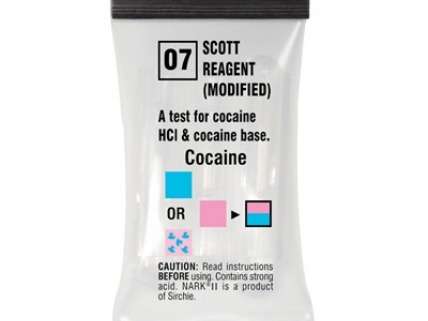'Tens of Thousands' Wrongly Convicted Based on Unreliable Drug Tests
A crumb on the floor of your car can make you a felon, even if it's just a crumb.

ProPublica reporters Ryan Gabrielson and Topher Sanders estimate that widely used but notoriously unreliable field tests for drugs have led to "tens of thousands" of wrongful convictions in the United States. The tests are not admissible in court, but that does not matter much, since the vast majority of drug cases—90 percent or more—are resolved by plea deals. Gabrielson and Sanders' story, which was published in The New York Times Magazine over the weekend, illustrates that point with the case of a Louisiana woman, Amy Albritton, whose employment prospects were ruined by a felony conviction after Houston police pulled over her car in 2010 and found a white crumb they mistakenly identified as crack cocaine.
The test that was used to incriminate Albritton involves dropping a suspected drug sample into a vial of cobalt thiocyanate, which is supposed to turn blue in the presence of cocaine. But as Gabrielson and Sanders note, "cobalt thiocyanate also turns blue when it is exposed to more than 80 other compounds, including methadone, certain acne medications and several common household cleaners." That is not the only cause of false positives:
Other tests use three tubes, which the officer can break in a specific order to rule out everything but the drug in question—but if the officer breaks the tubes in the wrong order, that, too, can invalidate the results. The environment can also present problems. Cold weather slows the color development; heat speeds it up, or sometimes prevents a color reaction from taking place at all. Poor lighting on the street—flashing police lights, sun glare, street lamps—often prevents officers from making the fine distinctions that could make the difference between an arrest and a release.
It is hard to say exactly how common false positives are, although a Las Vegas study found that one out of three samples identified as cocaine was in fact something else. In Florida, Gabrielson and Sanders write, "21 percent of evidence that the police listed as methamphetamine after identifying it was not methamphetamine, and half of those false positives were not any kind of illegal drug at all." Since field tests are widely used and police arrest more than 1 million people for drug possession every year, even a relatively low error rate could lead to thousands of erroneous arrests each year. In their analysis of drug cases in Harris County, Texas (where Albritton was arrested), Gabrielson and Sanders found that 212 people were convicted of possessing a substance that a field test mistakenly identified as an illegal drug between January 2004 and June 2015. "If Albritton's case is one of hundreds in Houston," they write, "there is every reason to suspect that it is just one among thousands of wrongful drug convictions that were based on field tests across the United States."
Despite the dubious nature of the evidence against her, Albritton ended up taking a plea deal that involved a 45-day jail sentence after she was told that she otherwise could spend up to two years behind bars. She ultimately spent just three weeks in jail, but that was the least of her punishment. She lost her job as the manager of an apartment complex in Monroe, Louisiana, and her new status as a felon made it impossible to find steady work that paid nearly as well, which in turn made it difficult to care for a son with cerebral palsy. Her whole life was upended by a crumb on the floor of her car that a lab test later found was not any sort of illegal drug. Albritton had no idea she had been exonerated until Gabrielson and Sanders tracked her down and got in touch with her.
In addition to the unreliability of field tests, Albritton's case illustrates the power that cops have thanks to excessive judicial faith in drug-sniffing dogs. Police supposedly stopped her car, which her boyfriend was driving, because he had failed to signal a lane change. It turned out the boyfriend did not have a driver's license, but the registration showed Albritton was the car's owner, making her presumptively responsible for any drugs police might find in it. At this point the cops had no justification for searching the car, as became clear when they asked her permission. Albritton consented to the search partly because she knew she was not carrying any drugs but also because one of the officers said that otherwise he would bring in a police dog. The implication was clear: Either he would search the car based on her "consent," or he would search it based on the dog's purported "alert," which like the field test might or might not actually indicate the presence of contraband.
One point that Gabrielson and Sanders do not make in their otherwise excellent exposé: It would be utterly absurd and unjust to lock Albritton up and ruin her life even if the speck of material on the floor of her car (which weighed in at less than two-hundredths of a gram) had contained cocaine. But whether or not they have anything to do with illegal drugs, Americans should be alarmed by the the fact that police have the power to stop your car at will, search it at will (assuming they have a dog or use the threat of one to obtain your consent), incriminate you with a test so unreliable that its results cannot be used in court, and railroad you into a felony conviction.


Show Comments (66)